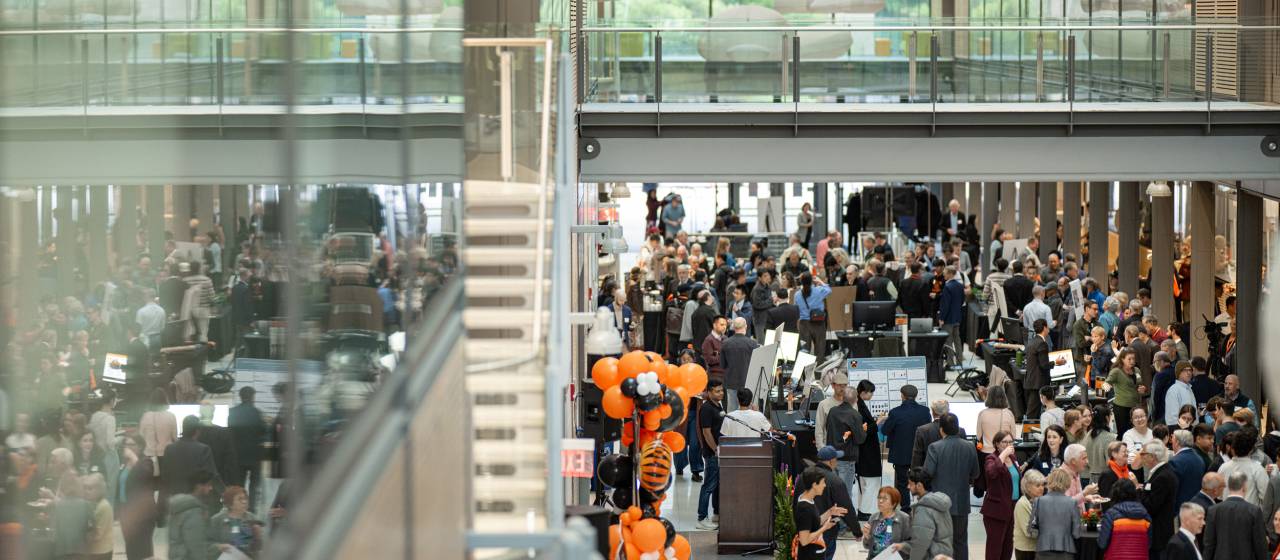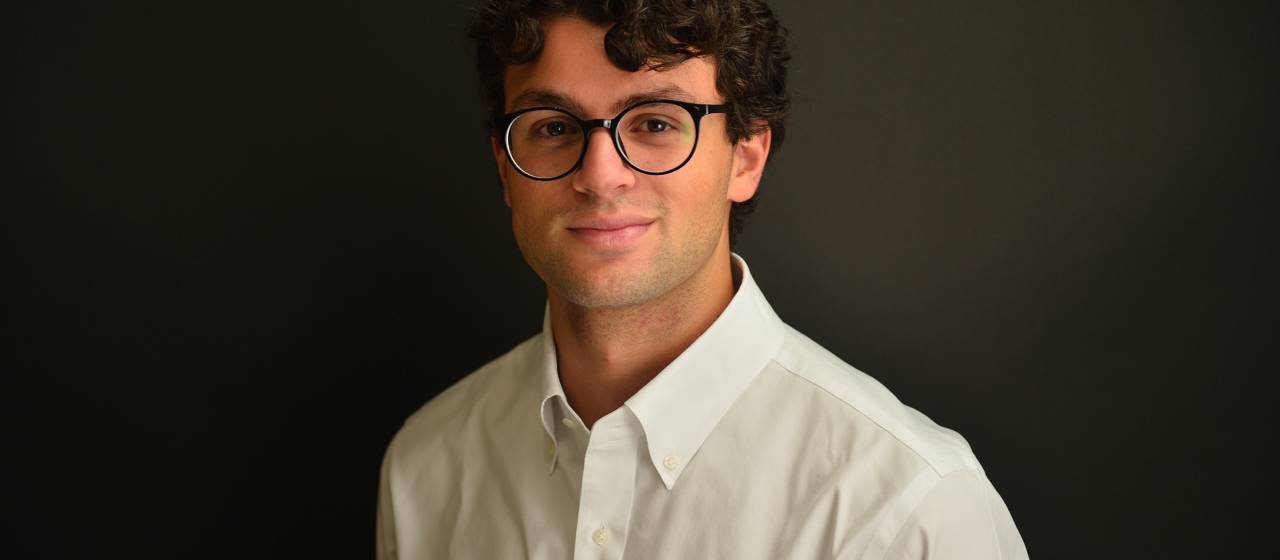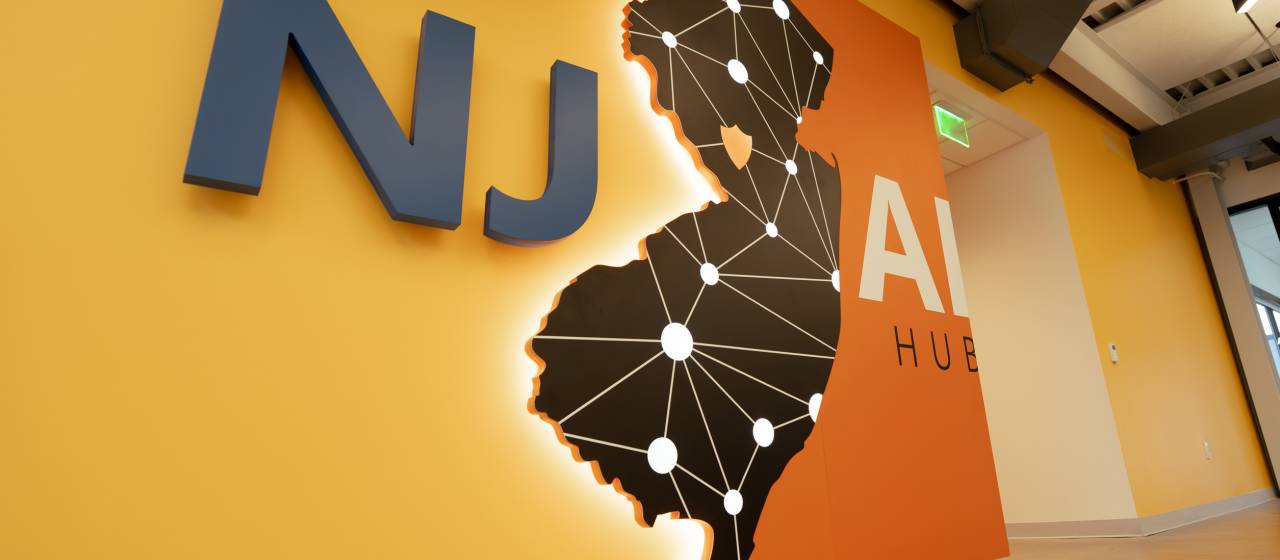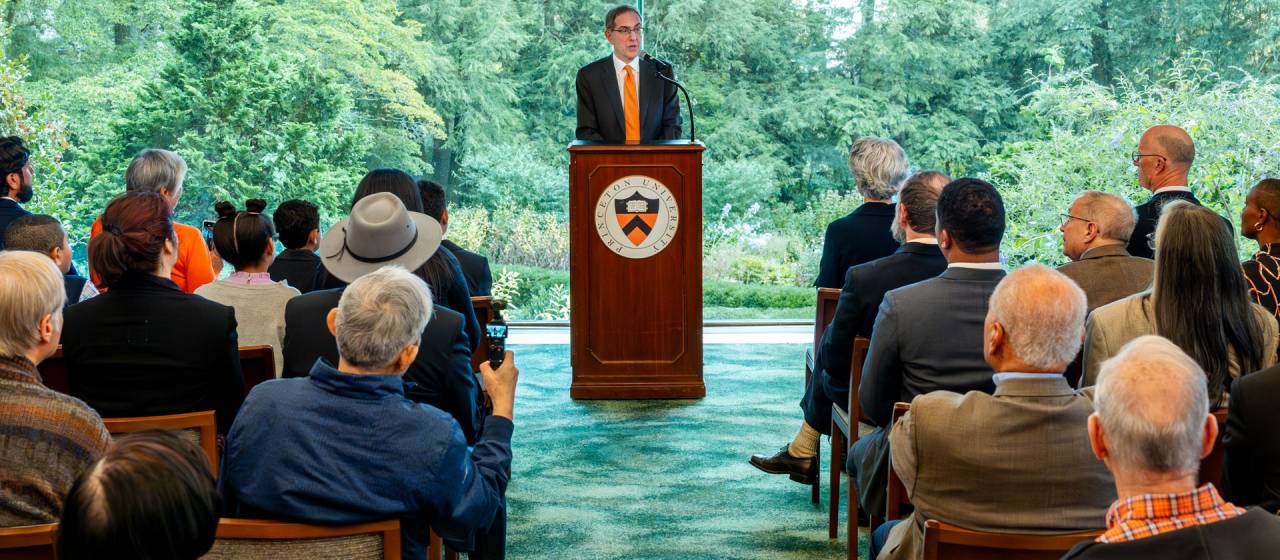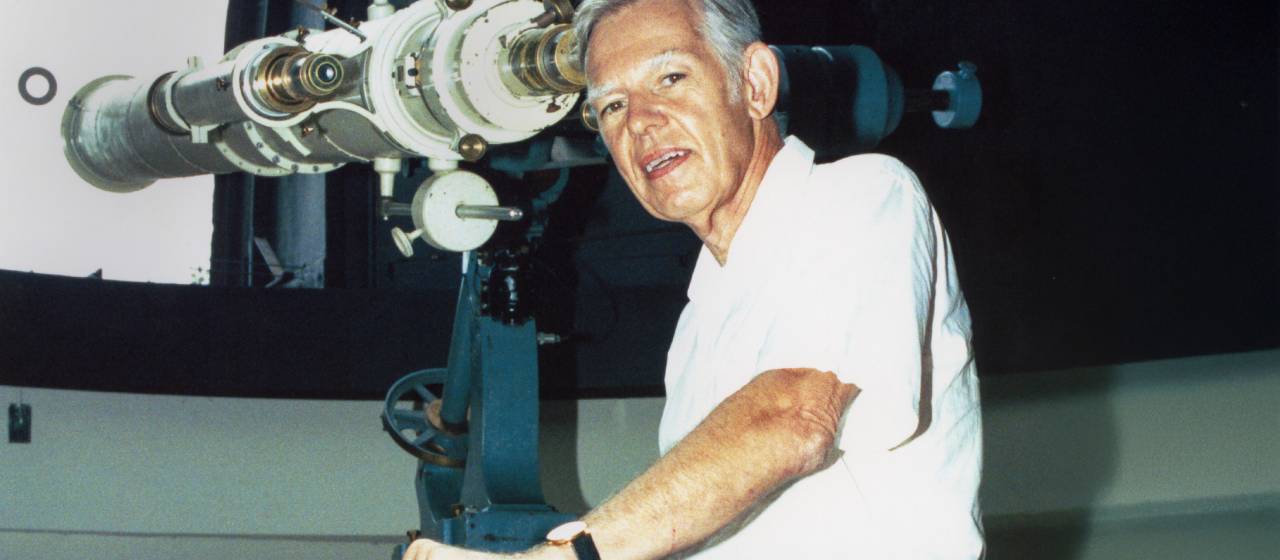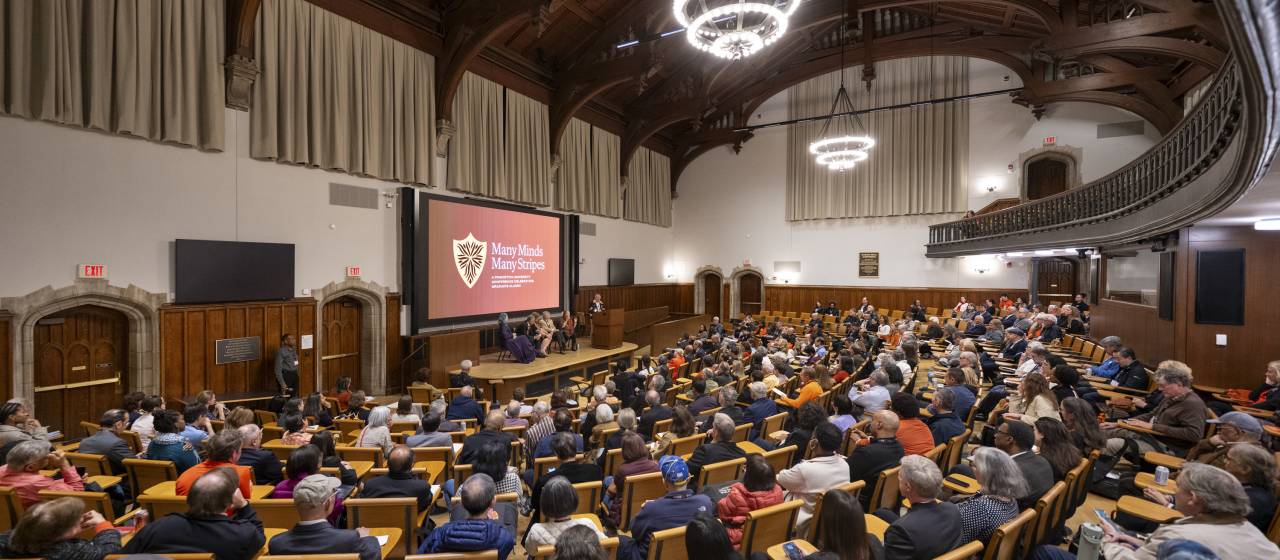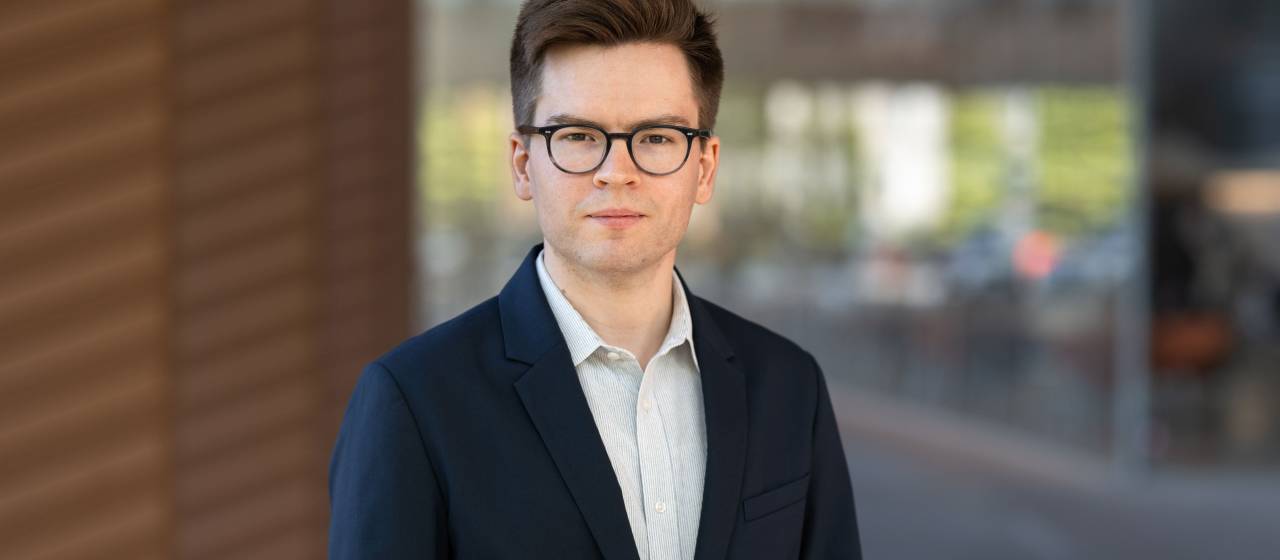Celebrate Princeton Innovation spotlights entrepreneurial researchers and their impact
A cross-section of New Jersey innovation leaders — faculty, researchers, students, inventors, entrepreneurs and investors —convened on campus last Wednesday for the annual Celebrate Princeton Innovation. The event is designed to spotlight University innovators, showcase ideas and forge new connections.
Craig Arnold, vice dean for innovation and University innovation officer, welcomed the crowd of about 400 attendees, noting the many accomplishments of the Office of Innovation as it marked its first anniversary.
The office engaged with more than 130 companies that are sponsoring and supporting research on campus, filed for 200 new patents for faculty researchers and helped faculty start seven new companies, said Arnold, who is also the Susan Dod Brown Professor of Mechanical and Aerospace Engineering.

In his welcome address, Vice Dean for Innovation Craig Arnold celebrated the groundbreaking research of Princeton faculty who are pursuing patents, licensing their technologies and founding companies.
He added that the Advancing Photonics Technologies program, led by the Office of Innovation, is a finalist in the $160 million National Science Foundation Regional Engines initiative.
Provost Jennifer Rexford, who was the keynote speaker, said innovation is increasingly central to the impact that Princeton hopes to make.
“I'm excited to celebrate the researchers here who show, through their ideas and their innovations, the vital role that universities play as engines of innovation for the country and for the world,” said Rexford, who is also the Gordon Y.S. Wu Professor in Engineering.
“Our innovators at Princeton really live up to our informal motto of ‘in the nation’s service and the service of humanity’ by grappling in their work with important societal challenges, whether it’s in health care or climate change or education or generally making our lives more fulfilling. The ambition they have to make their groundbreaking ideas escape from the lab and into the world inspires us,” she said.

In her keynote address, Provost Jennifer Rexford said innovation is increasingly central to the impact Princeton hopes to make.
The evening’s featured company was EnCharge AI, a startup based on Princeton research that develops computer chips that can store data and run artificial intelligence computations more affordably and more quickly while consuming less energy.
Naveen Verma, company founder and CEO and the Ralph H. and Freda I. Augustine Professor of Electrical and Computer Engineering, said it’s an exciting time to be a faculty member and an entrepreneur.
“Princeton has strengths across the disciplines in the humanities, social sciences, engineering and natural sciences like exists nowhere else on the planet,” Verma said. “If we think about the technologies that we’re building, these technologies we see today are going to have tremendous impact.”
To vigorous applause, Arnold presented two awards.
The Dean for Research Distinguished Innovation Award, which recognizes a faculty member and their team, was given to Felix Heide.
An assistant professor of computer science, Heide has founded companies based on his computer vision research and Princeton intellectual property, most recently Cephia. He said Princeton has an environment with multidisciplinary collaborations “that allows you to ask questions that are difficult, allows you to imagine the world around you in a new way, so that you can translate those questions into actions.”
Sean Zheng, a former Princeton postdoctoral researcher, received the Tiger Entrepreneur Award, given to an individual or a team of students, early-career alumni or postdoctoral researchers who demonstrate success in entrepreneurship.
Zheng is co-founder and CEO of PureLi, now called Princeton Critical Minerals, a clean-tech Princeton spinout that improves ways to extract lithium from brine water. He cited the entrepreneurial support he received from the Office of Innovation that led to a startup with three employees which has grown to a staff of nearly 20.
Throughout the evening, attendees visited faculty members exhibiting their research that has resulted in companies either being formed or already operating. The exhibitors included faculty from the schools of architecture and engineering, the Princeton Plasma Physics Laboratory, the McGraw Center for Teaching and Learning, and academic departments including astrophysics, chemistry and molecular biology.
Also exhibiting were programs and organizations including the Andlinger Center for Energy and the Environment, the Princeton AI Lab, the Keller Center, the New Jersey AI Hub, the New Jersey Commission on Science, Innovation and Technology, the Omenn-Darling Bioengineering Institute and Princeton Innovation Center BioLabs.
In his concluding remarks, Arnold thanked everyone for coming. “Let’s keep building bridges, breaking barriers and benefiting society,” he said. “Let’s do it together.”

Naveen Verma, a professor of electrical and computer engineering and CEO of EnCharge AI, discussed the importance of fundamental research and innovation.
Latest Princeton News
- Princeton senior Isam Mina awarded Rhodes Scholarship for Jordan
- Founding partner Microsoft to bring new Discovery AI technology to NJ AI Hub
- Prospect House spaces dedicated for ‘exemplary individuals’ who helped to shape the University and the world
- Russell Kulsrud, one of the last survivors of Project Matterhorn, dies at 97
- 'Many Minds, Many Stripes' conference celebrates Princeton's community of graduate alumni
- Michael Skinnider wins 2025 Packard Foundation Fellowship



